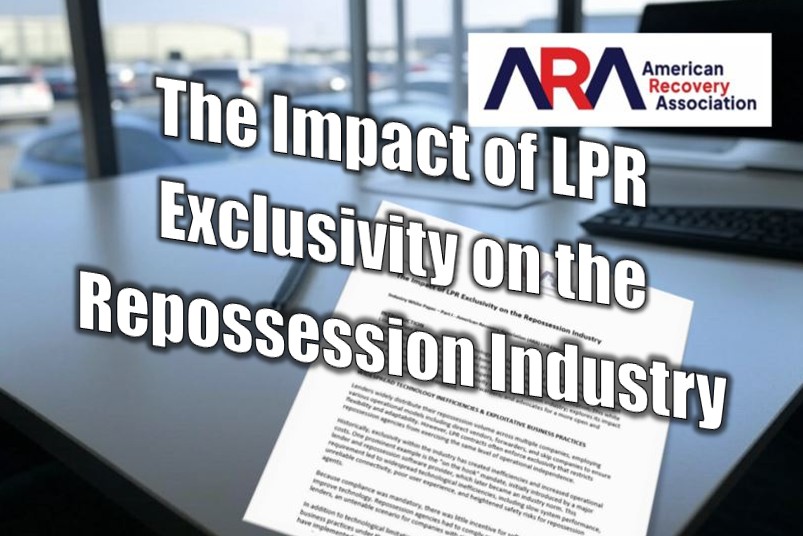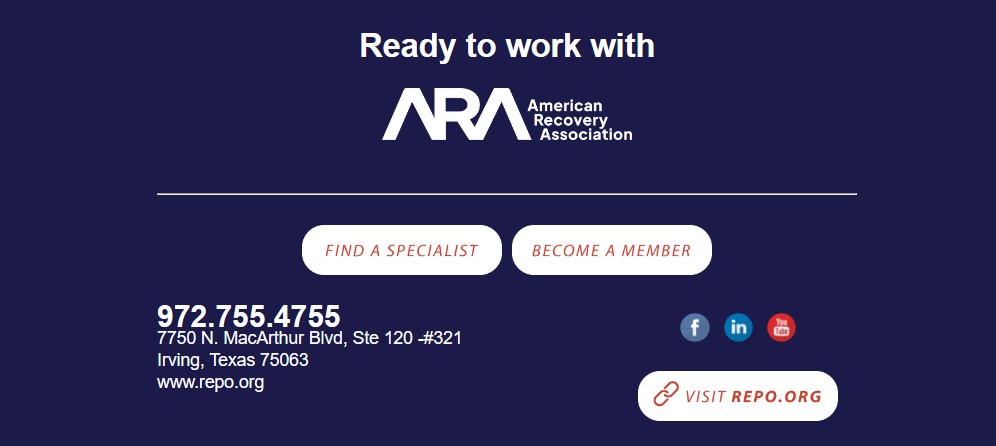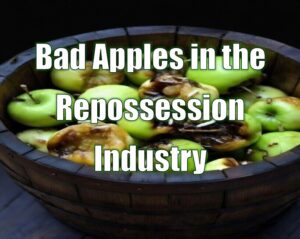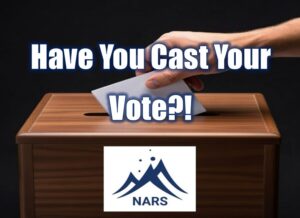Industry White Paper – Part I – American Recovery Association (ARA) LPR Committee
INTRODUCTION
License Plate Recognition (LPR) technology has played a crucial role in modernizing the repossession industry by enabling real-time vehicle tracking and recovery. However, exclusive agreements imposed by LPR companies on repossession agencies have introduced significant operational restrictions, limiting fair competition and impeding market innovation. This white paper examines the effects of LPR exclusivity on the repossession industry; explores its impact on lenders, repossession agencies, and forwarders; and advocates for a more open and competitive business environment.
WIDESPREAD TECHNOLOGY INEFFICIENCIES & EXPLOITATIVE BUSINESS PRACTICES
Lenders widely distribute their repossession volume across multiple companies, employing various operational models including direct vendors, forwarders, and skip companies to ensure flexibility and adaptability. However, LPR contracts often enforce exclusivity that restricts repossession agencies from exercising the same level of operational independence.
Historically, exclusivity within the industry has created inefficiencies and increased operational costs. One prominent example is the “on the hook” mandate, initially introduced by a major lender and repossession software provider, which later became an industry norm. This requirement led to widespread technological inefficiencies, including slow system performance, unreliable connectivity, poor user experience, and heightened safety risks for repossession agents.
Because compliance was mandatory, there was little incentive for software providers to improve technology. Repossession agencies had to comply or risk losing contracts with major lenders, an untenable scenario for companies with significant operational costs.
In addition to technological limitations, exclusivity agreements have facilitated exploitative business practices under the guise of compliance. Software providers and affiliated entities have implemented inflated service charges, such as excessive fees for lot inspections, compliance tests unrelated to employees’ roles, and mandatory vetting services that deliver minimal value.
These exclusivity-driven practices have concentrated market power into the hands of a few select entities, prioritizing profit over industry advancement, stifling innovation, and restricting competition.
Recent leadership changes in repossession software companies have introduced a more forward-thinking perspective that recognizes the negative impact of exclusivity on business growth. However, exclusivity remains a pressing issue in a critical segment of the industry—LPR. Many of the original LPR contracts between providers and repossession companies, as well as between LPR providers and forwarders, were established under vastly different market conditions. Today, these exclusivity provisions disproportionately benefit a select group of LPR-favored entities while disadvantaging others.
Under existing LPR agreements, forwarders not classified as “Chosen Ones” are excluded based on subjective survey results, while repossession companies lose access to their own scan data. Lenders, in turn, are not required to work with the repossession agencies that originally captured the scan data but can instead assign recoveries to the lowest-cost service provider, disregarding quality and expertise. Additionally, “Chosen Ones” gain privileged access to LPR data and receive preferential treatment in asset staging decisions, further exacerbating market imbalances.
A FREE ENTERPRISE SYSTEM FOR LONG-TERM INDUSTRY SUSTAINABILITY
A free enterprise system, where competition is based on value rather than exclusive contracts and backroom deals, is essential for long-term industry sustainability. The growing market dominance of a single LPR provider with limited alternatives signals an urgent need for a new, independent LPR entity that operates without legacy constraints or affiliations with forwarders.
Such a shift would restore fairness and innovation to the industry. Alternatively, stronger leadership that prioritizes the industry’s overall well-being over short-term financial gains could initiate meaningful reform.
A well-known repossession logistics company provides a successful example of how a company can thrive by embracing free enterprise principles. Their success stemmed from their value-driven approach, refraining from restrictive contracts and prioritizing service quality. Their philosophy was simple: “Do business with us because we provide value. If we stop delivering value, we do not deserve your business. Losing clients should serve as a wake-up call to improve our technology, service, and overall performance.” This approach fostered a culture of continuous improvement—an ethos currently absent in the LPR sector.
For the repossession industry to evolve and remain sustainable, the principles of fair competition, technological innovation, and value-driven service must replace exclusivity-based business models. The future of LPR must be built on open competition, rewarding efficiency and service excellence rather than contractual restrictions and monopolistic control.
This white paper is the first in a three-part series presented by the ARA LPR Committee. Future installments will further analyze the consequences of LPR exclusivity and explore potential solutions to create a fairer, more competitive marketplace.
At the conclusion of this series, the ARA LPR Committee will conduct an industry-wide survey to gauge the perspectives and concerns of repossession professionals. Your feedback will be instrumental in shaping the future direction of LPR policies and ensuring that the repossession industry remains equitable and sustainable for all stakeholders.
American Recovery Association (ARA) LPR Committee
ABOUT AMERICAN RECOVERY ASSOCIATION
Originally chartered on July 22, 1965, and located in Dallas, Texas, American Recovery Association (ARA) is a membership organization made up of more than 260 repossession business owners providing service from more than 500 locations to more than 27,000 national and international cities. As the world’s largest association of recovery professionals, ARA strives to be a leader and advocate for the recovery industry by providing member support, education, and certifications; fostering relationships between the lending community and repossession agents; and hosting the annual three-day North American Repossessors Summit (NARS) – the largest repossession conference in the industry. For more information, go to repo.org or call (972) 755-4755.













More Stories
Impound Repossessions and the Risk of a Two-Tier Compliance System
Recovery Agent Protection Committee Seeks Input
Clarification Secured on Condition Report Contract Language
Unlock the Power of Modern Skip Tracing with Alex Price
ARA and Westlake Collaborate to Clarify Processes and Strengthen Industry Standards
ARA Westlake Financial Services Update